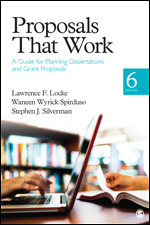Proposals That Work
A Guide for Planning Dissertations and Grant Proposals
- Lawrence F. Locke - University of Massachusetts at Amherst, USA
- Waneen Wyrick Spirduso - The University of Texas at Austin, USA
- Stephen J. Silverman - Teachers College, Columbia University, USA
Very useful text and I have been using this book while teaching and/or supervising post-graduate taught and research students.
A valuable guide for practitioners and students in the fields of research and funding applications. Easily accessible format provides insightful advice and guidelines for students and practitioners new to funding and research application practices.
This text serves as an important resources for doctoral students involved in research on international development.
this is a useful guide to help students to think through the complexities of project planning
Excellent resource for dissertations. The authors provide a down-to-earth approach to all phases of the dissertation, from reviewing research to publishing results. They also provide practical and realistic descriptions of political and interpersonal issues with chairs and committees, which surprised the students. I recommend it particularly for students in EdD programs who have limited experience with academic settings.
This is a very useful book for students needing to think about bid writing. In a challenging employment market within the community and youth work field i will now be recommending this book to students on my course.
This has been included in our recommended reading list.
Course Change
Starting Chapters are relevant to the course contents (proposal writing). Although later parts are perhaps good if you are looking for a broad overview on funding and diverse proposal examples on related topics, it is less of interest for this particular class.
A wide variety of considerations are involved in the decision to produce a new edition for an established textbook such as Proposals That Work (PTW), and our sixth effort is no exception. We did the following:
- Updated everything
- Continued the focus on funding for student research and enhanced and extended the information on locating grants
- Provided contemporary insights into the grant review process
- Added a chapter on mixed methods research that provides expanded resources and advice for undertaking a M-M study
- Updated and expanded sections on the use of technology in finding and reading research, for presenting research, and for finding grant information
- Added examples from additional academic fields
- Extensively updated the references
- Updated and expanded the resources to obtain additional information
- Included two new specimen proposals. One deals with a multi-experiment study and provides totally new information on how to craft a proposal for these types of study. The second is a qualitative proposal where we concentrated on everything but the literature review (that has two other examples) and will extend and provide a model for those doing qualitative research. Both of these are totally new and (I think) provide excellent advice--in addition to the two others that also do that.
- Updated and expanded (slightly) the annotated bibliography
Following the major revisions of the Part II on grants for research in the fifth edition we have further focused the two chapters on the information graduate students need to pursue funding. The sections on how and where to find grants have been expanded and all the technological advances that have taken place since the last edition have been integrated into this guide. These chapters provide a thorough introduction to the preparation of grant proposals for students seeking financial support for theses and dissertations.
To respond to the need for more graduate student guidance on preparing proposals for mixed methods research this volume includes a chapter on the topic. As a part of the chapter we provide a group of resources for learning more and then provide advice for the student preparing a mixed methods proposal. The chapter builds on what precedes it and those considering mixed methods dissertations will want to read this chapter early to get a perspective of the task.
As we have done over the last few editions of PTW, we have included two new specimen proposals in the sixth edition. Proposal 1 is a multipart experimental study. In many academic areas in the social and behavioral sciences a series of studies now is the standard for dissertation research. This proposal and our comments show the particular demands of a multipart study and how the tasks of proposing a dissertation can be tailored to more complex research. Proposal 2 is a qualitative study where the student is engaged in field research. We have edited this proposal to focus on making a case for the study and detailing the methods. The special nature of qualitative research is reflected throughout this proposal—as are all the generic tasks that are required. When combined with proposals 3 and 4 readers will have good sense of various ways to craft a proposal that wins committee approval or funding.
Finally, throughout the book we have paid special attention to expanding examples and suggesting resources to many academic areas. The success of PTW and its utility across university campuses requires this, but we have worked to make certain the examples do not require a technical background in any one discipline.

